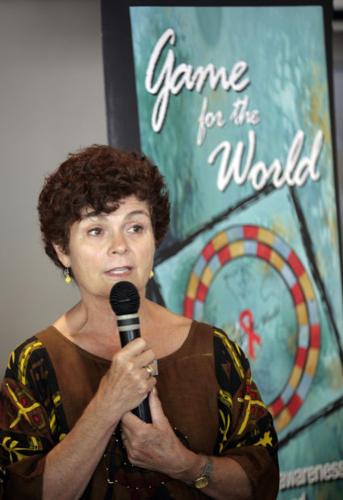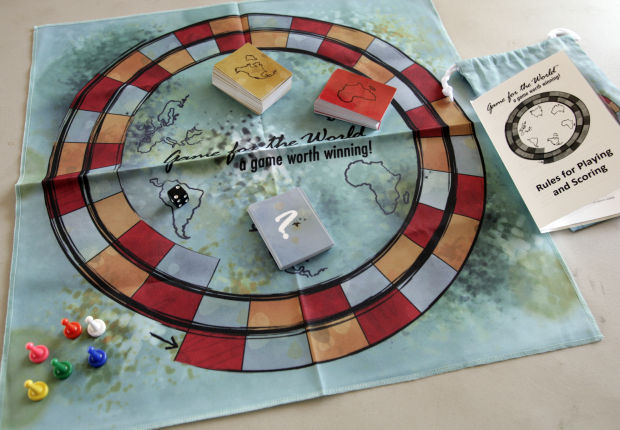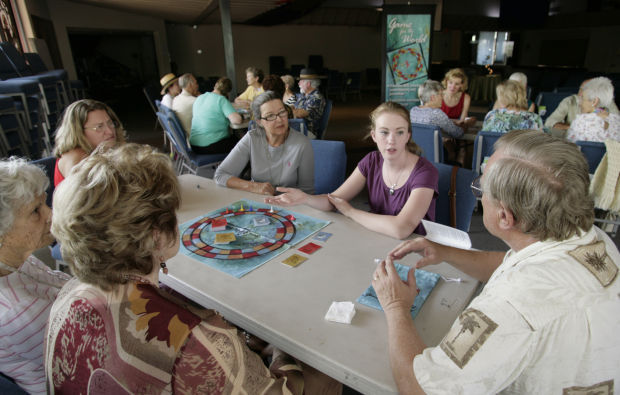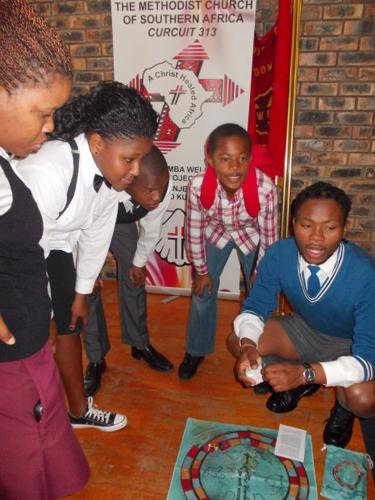Thanks to a game created by Tucsonan Anne Harman, Kenyan schoolchildren will roll dice and draw cards to learn about HIV and AIDS as part of their class curriculum.
Earlier this month, 41 teachers in Kenya received group training on how to use Harman’s Game for the World in their classrooms. About 3,000 of the games have been distributed in more than 30 countries by Harman’s nonprofit organization, Games for Life. Kenya’s Ministry of Education, Science and Technology is the first to approve the game for school curricula.
Harman launched Game for the World from Tucson in 2008 as an engaging and safe way to talk about HIV and AIDS. Besides English, the game comes in six languages — Spanish, French, Swahili, Xhosa, Afrikaans and Zulu.
Teaching about HIV and AIDS can be awkward, scary and maybe even boring, says Harman, 64. But the game “actually has people laughing and getting to know people better and taking action instead of sitting there and not doing anything.”
Not only does the game educate, but it also encourages players to get tested.
Two years ago, on a three-month trip through South Africa, Tanzania and Uganda, Harman visited villages where children clamored around the game, asking each other questions otherwise taboo in many African communities.
“Tell the group what animal you think HIV/AIDS would be if it was an animal,” reads one of the cards.
Harman has played her game with people from around the world, and players often tick off deadly animals — snakes and tigers, for example — in response to this question. Sometimes, she gets a surprise.
“One Canadian man who has AIDS said, ‘A panda bear,’” she says. She questioned his choice of such a positive image. “He said, ‘I’ve got AIDS, and I embrace it,’ and it started off a whole discussion.”
LET THE GAME BEGIN
Harman never saw herself as the one to take action about HIV and AIDS.
She grew up in Canada loving board games, and became the CEO of Mallan Group Training and Management 21 years ago. The company produces KnowMe interactive games, which build trust within businesses and youth groups by asking questions.
Game for the World is based on the same model, with players choosing from factual, personal disclosure and group feedback cards. It is designed for players ages 12 and up, and is “safe,” meaning people with AIDS can play without disclosing their status.
Harman first encountered this kind of trust-building game while working in South Africa in the 1980s as a management and conflict resolution trainer. She moved back to Canada, and eventually partnered with the creator of that trust-building game that she calls the “predecessor” of the KnowMe games. In 1995, she and her husband, Alan Harman, moved to Tucson, and she bought her partners out about 10 years ago.
Game for the World was the suggestion of Harman’s South African distributors, who saw the need for HIV and AIDS education, and thought a game could help.
She was no expert on the topic, but realized that if she didn’t do it, no one would.
MAKING IT PERSONAL
Harman started working with Dr. Kevin Carmichael of El Rio Community Health Center’s Special Immunology Associates and Anne Maley, the founding executive director of the Southern Arizona AIDS Foundation. Both shared their expertise and staff.
“I would help her with what to ask people and how it might be helpful to begin a discussion that often might be difficult to have with friends, family and employers,” says Maley, who used another KnowMe game with her own staff, and is now a consultant for nonprofit organizations and businesses.
In 2008, Harman debuted the game at the International AIDS Conference in Mexico City.
“I used to think AIDS was something that happened to someone else,” she says, “but it can happen to anyone.”
She and her husband had their own scare about 20 years ago when his oldest son told the couple he had AIDS. He lived in South Africa, and they lived in Canada. It turned out not to be true. “It was one of the scariest times of my life,” she says of those six months.
“Just by chance, the world AIDS conference was in Vancouver that year, so I went and found everything I could,” Harman says. “It was a really personal thing.”
Special focus on AFRICA
While Harman has always intended for the game to have international use, she has focused on Africa, depending on old and new contacts to distribute it there.
Almost 70 percent of new HIV infections worldwide occur in sub-Saharan Africa, and in 2013, with approximately 24.7 million people in the region living with HIV, it was the world’s “most affected region,” the World Health Organization says.
“Poverty has crippled Africa, and the consequences are severe,” says Naomi Lanoi, who moved to Tucson from Narok County in Kenya to study law at the University of Arizona. Lanoi just earned a master’s degree in legal studies, and her husband is finishing his doctorate degree in law. They plan to return to Kenya in a year or so with their two children.
Harman and Lanoi met through a mutual friend while hiking Tumamoc Hill. When the conversation turned to Harman’s game, the women decided to meet again to play.
For Lanoi, 33, it struck an emotional chord. She lost a close relative to AIDS.
“As a family, we never talked about it, actually,” she says. “Not a single day did you talk about it, even when he was alive and we knew what was killing him. But none of us could communicate about it, and I never knew I would share this story with anyone.”
She opened up because of Game for the World.
“The game gives you confidence and allows you to talk about your experience,” she says. “I was shocked that I could talk about something I had kept so secretive.”
Lanoi wanted the game played in her home country, where mentioning HIV and AIDS brings the immediate stigma of promiscuity.
Her husband took the game with him while visiting Kenya. He shared it with organizations, including a drama group called the Linda Arts Organization, which adopted and shared the game. It made its way around the country, from rural schools to the Ministry of Education, Science and Technology.
BUMPY ROADS
Harman’s connection to the Methodist Church of Southern Africa has also moved the game through other countries in the region. In Tucson, she attends Saint Francis in the Foothills United Methodist Church.
On their three-month trip about two years ago, Harman and her husband bumped down roads to get to schools.
“We were out in the boonies,” Harman says. “I remember calling one Methodist minister to tell him we would be late to meet him because we were lost, and he said, ‘Welcome to Africa.’”
UA graduate Adam Rubin and Tanzanian Uswege Mwakapango, two men who had already been distributing the game, accompanied them.
In Tanzania, Harman saw it played in Swahili for the first time.
“I’ll never forget going to this remote school, and the headmaster said that this game is really important to Tanzania’s future,” she says. He went on to tell the group that peer educators of the game demonstrated more confidence and better critical-thinking skills than their classmates. Some students also planned to do outreach with the police and local prison.
“The kids were becoming community leaders with the game,” Harman says.
Another friend took the game to Uganda as part of her work with the Peace Corps, and after simplifying the cards and the art on the cloth “board,” the game is now being manufactured there. It is the only place outside of Tucson where the game is produced, but Harman would like to see that spread.
“It’s been a bumpy ride trying to find something that worked, ... ” says Alan Harman, 74. “You do get your ups and downs, just the same as you do in life.”
Rubin, 26, says this is not a rigid project.
Harman “has allowed the project to move forward organically on its own,” he says. “It’s flourishing into something she didn’t expect.”
Donations and grants have provided the funding so far, and in April, Harman will find out if the game made it through the first round of cuts for a Bill & Melinda Gates Foundation grant.
“My faith believes that we are all one, we are all connected, and we all have a duty to one another to look out for one another,” she says. “We can’t say what happens in Africa doesn’t impact us here. We are a world community.”







